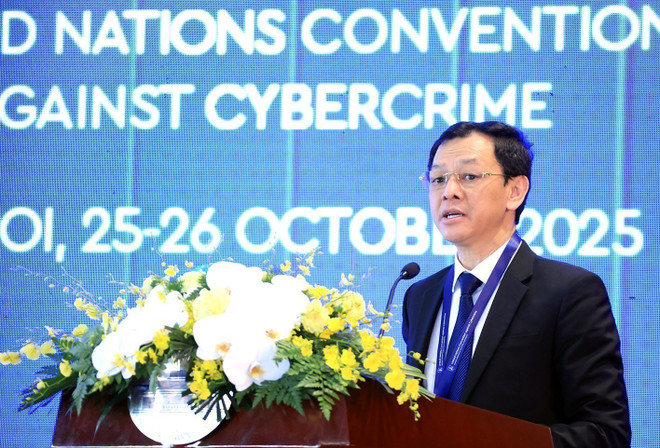No country, regardless of its level of digital development, is immune to cybercrime. Criminals exploit jurisdictional gaps, anonymity tools, and rapid technological change to evade detection. Given the scale and cross-border nature of cyber threats, only close international cooperation can ensure effective cybercrime prevention, investigation, and handling.
Delegates at the roundtable on protecting women and children in cyberspace on October 26 (Photo: VNA)
Vietnam places strong emphasis on communication, education, and digital literacy as key pillars for child protection in cyberspace, Deputy Minister of Health Nguyen Tri Thuc said on October 26, stressing that technology is only safe when people have the knowledge and skills to use it responsibly and creatively.
He made the remarks at a roundtable on protecting women and children in cyberspace, jointly organised by Vietnam’s Ministry of Foreign Affairs and Ministry of Public Security, and the United Nations Office on Drugs and Crime (UNODC). The event, held on the sidelines of the signing ceremony of the United Nations Convention against Cybercrime (Hanoi Convention), aimed to foster global cooperation toward building a safe and humane digital environment for all.
Thuc said the digital era offers vast opportunities for children to learn, connect, and create, but also exposes them to serious risks. In recent years, Vietnam has stepped up efforts to enhance online child safety through major laws, including the Law on Children, the Law on Cybersecurity, and the Law on Personal Data Protection. Public awareness campaigns and training programmes have been launched nationwide for teachers, parents and children to promote safe online behaviour and self-protection skills.
Initiatives such as “Not Alone – Together for Online Safety,” “Digital Vaccine,” and the “Students and Information Safety" contest have not only provided knowledge but also inspired a humane, respectful, and inclusive Internet culture, contributing to the creation of a healthy online environment where children are protected, listened to, and able to develop holistically.
 Deputy Minister of Health Nguyen Tri Thuc speaks at the event. (Photo: VNA)
Deputy Minister of Health Nguyen Tri Thuc speaks at the event. (Photo: VNA)Vietnam has also established a national network for online child protection linked to the national hotline 111 to handle related cases. Authorities are enhancing coordination among agencies in preventing, investigating, and handling online child abuse while leveraging digital platforms to raise awareness and share best practices.
Cybersecurity units have introduced technical and investigative measures to detect, prevent, and strictly handle online offences targeting children. Telecommunications, Internet, and social media providers have been urged to exercise greater social responsibility by controlling harmful content and ensuring safer platforms for young users.
Vietnam also considers international cooperation a cornerstone of online child protection. Relevant agencies have worked closely with global law enforcement bodies, including the International Criminal Police Organisation (INTERPOL), to strengthen capacity, share expertise, and develop cross-border legal and technical mechanisms. The country has also expanded bilateral and multilateral partnerships and maintained collaboration with international organisations operating in Vietnam to foster a safer cyberspace globally.
Despite the progress, Thuc acknowledged that challenges remain as cybercrime grows more sophisticated while technical capacity and inter-agency coordination remain limited. Differences in legal systems and limited resources also hinder information sharing and law enforcement cooperation, requiring continued investment, innovation, and stronger partnerships, he said.
David Wright, Director of the UK Safer Internet Centre, said the Hanoi Convention represents a global solution to promoting international cooperation against cybercrime. In particular, its provisions on online child protection go beyond existing international frameworks, introducing several groundbreaking measures.
Article 16 of the convention, he noted, explicitly defines the intentional dissemination of non-consensual intimate images as a criminal act under international law - a major step forward in protecting privacy and human dignity.
Experts at the forum agreed that no country, regardless of its level of digital development, is immune to cybercrime. Criminals exploit jurisdictional gaps, anonymity tools, and rapid technological change to evade detection. Given the scale and cross-border nature of cyber threats, they stressed that only close international cooperation can ensure effective cybercrime prevention, investigation, and handling./.